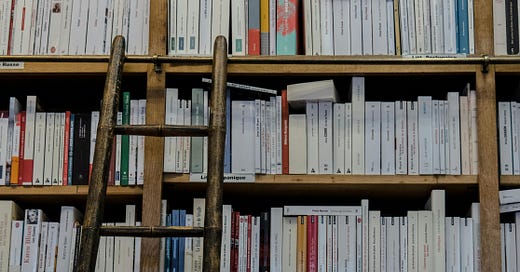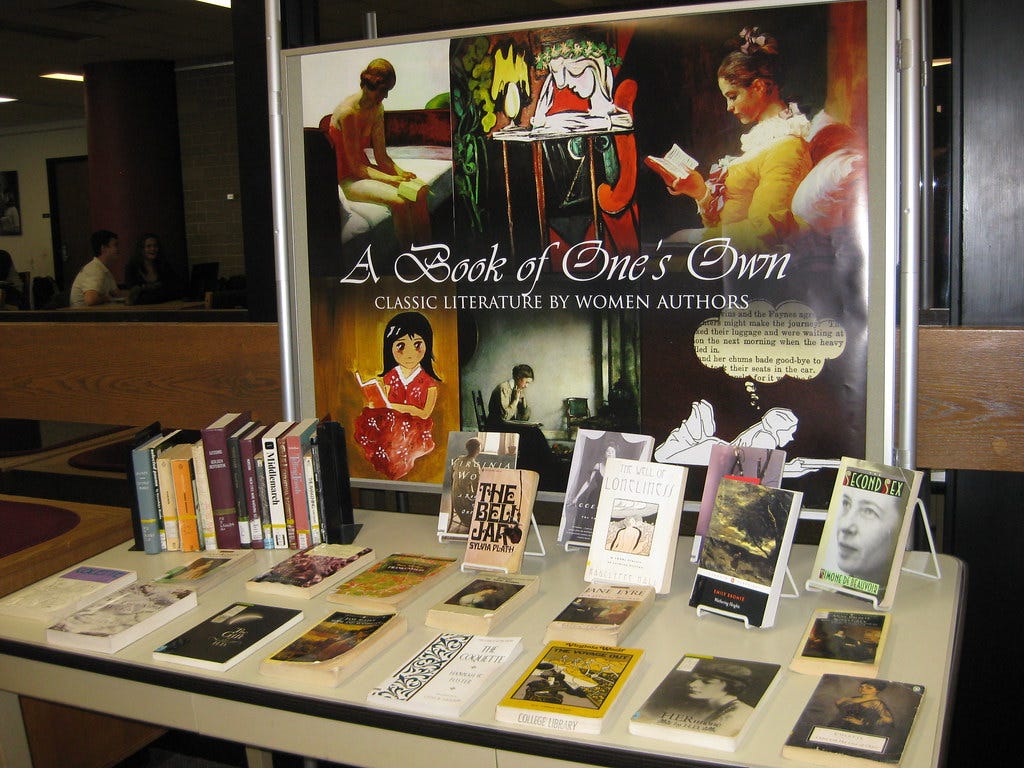A Bookshop of One's Own
How a group of women set out to change the world - one book at a time
Welcome to A Narrative of Their Own, where I discuss the work of 20th century women writers and their relevance to contemporary culture.
If you enjoy reading essays on literature as well as monthly reviews of great books and recommended reading, please consider a free or paid subscription.
I recently had the pleasure of attending a book festival event held in my home city with the writer Jane Cholmeley, who has recently published A Bookshop of One’s Own, a non-fiction book about the pioneering feminist bookshop she and two friends opened in 1984.
I hadn’t known anything about the shop named Silver Moon, and found both the event and the book wonderful, especially as many women in the audience had visited it during its inception in the 1980s and 90s.
The bookshop was set up to promote women’s writing and address the lack of availability of this in other bookshops. Their aim was to bring forward women’s voices together from all over the world, as well as provide related materials such as feminist pamphlets and consciousness raising materials, that women would be unlikely to find elsewhere.
After a long hunt to find shop premises that were affordable in London, but not too close to the other two existing feminist bookshops, they finally received a tip-off that two premises had become available on the Charing Cross Road, infamous for its row of bookshops, which enticed keen book buyers to browse all along the row. The council had further stipulated that the premises must be used as bookshop space: it was serendipity for the women.
Jane explained in her discussion how they had been lucky enough to receive some government grant funding as the UK was severely lacking in the area of arts and culture, and therefore they acquired half the renovation costs this way. As she acknowledged, it is unlikely that they would be able to secure such a grant in today’s economic world.
Finding a home on the prominent Charing Cross Road, a well-known haven for book lovers and enthusiasts, the owners wished to establish a place to share the intersectional feminist rhetoric with a larger community of readers and to encourage open discussion of women’s issues. Jane stated that the placement of their business also had a knock-on benefit: as the shop was well-placed in a row of other booksellers, they received a regular flow of customers who would make their way down the street, stopping in every store. When asked what any male customers thought of the bookshop, Jane advised that the staff would take the opportunity to introduce a female author in the enquirer’s chosen genre. This often worked, helping them to spread the talent of women writers.
Jane’s talk was full of amusing anecdotes (as is the book) such as the booksellers having a bit of a laugh over placing a small stand at one side, displaying ‘men’s books’. This, she said, was a humorous nod to the many mainstream bookshops which featured only a tiny stand of “women’s books!”
On a more serious note, Jane advised that a certain senior member of the men’s prison service would stop by the shop in order to pick up literature on issues such as domestic violence, wishing to educate himself better on these issues. Jane also recalls that, although most male visitors to the shop were pleasant enough- if sometimes a little confused- the booksellers did receive some abuse, including a regular male customer who threw books at her.
Silver Moon stocked a prominent representation of female authors of colour, as well as books describing the lesbian and Black female experience. Importantly, these books and authors were featured on the main shelves, rather than demoted to less visible sections of the store as they may have been in other bookshops. Both teachers and librarians used the bookshop as a supplier and resource, enabling public accessibility to a more diverse literature of women and the issues affecting them.
The shop served both as a safe space for women to participate in literary events and a resource centre to learn about local feminist initiatives. They hosted many literary luminaries through their doors, including writer Toni Morrison, who had been struggling to get her books sold in UK mainstream bookshops. Other noteworthy events featured a book signing by Maya Angelou, visits from feminist authors Margaret Atwood and Jeanette Winterson, Alice Walker and Sandi Toksvig. They also hosted creative writing classes and feminist literature discussion groups.
Silver Moon also acted as a hub for feminist activism and information sharing by women’s political organisations and collectives, who were encouraged to promote their groups on the noticeboard. Free copies of gay and lesbian newspapers were also available as well as feminist audiobooks for the visually impaired.
The book is littered with humorous and often poignant stories about the trials and tribulations of running the shop, the customers they received and the women writers whose work they managed to bring forth to the UK market.
Bookshops such as Silver Moon became an important part of the Women’s Movement, allowing for a safe space for women to meet and discuss ideas, as well as share the knowledge of other women and promote the writing of women of colour and lesbian literature.
Silver Moon ran successfully until 2001, when, after seventeen years, it sadly closed its doors. The reason for the closure was mostly due to the rising cost of rents and the opening of large chain bookstores which could afford to discount their books. This was a natural fallout following the end of the The Net Book Agreement, which fixed a book’s price in the UK and Ireland between The Publishers Association and booksellers. This meant that all places where books were sold had to adhere to this set selling price, providing a level playing field for booksellers. Once this was removed however, large commercial outlets such as supermarkets could afford to sell books at less than the price independent booksellers such as the owners of Silver Moon could acquire them for.
Jane also pointed out somewhat wistfully that in effect, Silver Moon had achieved its aim: more booksellers were featuring feminist and women’s literature. However, this had a bittersweet edge, since it now meant that they simply struggled to compete in such a competitive market, where the odds were severely stacked against them.
As Jane’s book illuminates, independent enterprises such as Silver Moon get tougher and tougher to keep open amidst the ever-growing monopolies of larger stores and supermarkets able to offer cheaper books to consumers, not to mention the beast that is the Goliath online bookseller.
What was also interesting at the event was a general discussion around small, independent publishing houses and literature events in general. Partner in indie publishing house And Other Stories, Tara Tobler, was interviewing Chomleley on stage and talked about how finding a brilliant author and making them a success is a double-edged sword. Speaking about Deborah Levy, whom And Other Stories represented with her book Swimming Home, she says they were delighted when the book they took a chance on became nominated for the Booker Prize. However, it inevitably meant that they eventually lost the successful author when larger publisher’s came knocking, a bittersweet pill to swallow for many indie publishers.
This was a theme then taken up by the director of the festival, who mentioned that many small literary festivals around the country have declined due to lack of funding and larger companies running book tours for big-name authors.
In my home city, we have a yearly literature festival run by the local university and a few independent bookshops left, one of which specifically sells women and LGBTQ+ literature called Juno (who were at the event selling Jane’s book) as well as a brand new store around the corner from where I live (oh, joy!) called Novel.
I get it though: in an ideal world, we would all walk around the corner and browse for a book, chatting with the knowledgeable bookseller and buying our reading materials. But times are hard: online book-buying can often be much more accessible, as well as cheaper. Buying second hand is also often better for the planet. I know I personally would love to only buy my books brand new from a bricks and mortar bookshop, but because of financial constraints, I usually either wait for them to come to the library, or buy them second hand.
However, after attending this event, I decided on a goal moving into the new year: I am determined to support more independent businesses, particularly bookshops, as well as look to read books put out by indie presses. It feels like a good thing to do right now. It feels a little bit rebellious, a bit like the women of Silver Moon.
After all, if we don’t support these brave souls who put themselves out there, striving to make something meaningful, we will all end up with cookie cutter high streets and slaves to the capitalist machine.
Where do you like to buy your books? Do you borrow or buy? I’d love to know in the comments!
And speaking of capitalist machines…why not support an independent writer this “Black Friday” season?! My paid subscribers help me to celebrate the work of brilliant women every single week, and for about the price of a decent cup of coffee a month. Thank you for your support 🙂







Such a delight to learn about this bookshop. One of my very favorite bookshops is a feminist bookstore in Tucson that's managed to still keep going when so many haven't. I had the chance to interview the current owners recently which was wonderful: https://www.narratively.com/p/an-old-feminist-bookstore-is-still-a-safe-space
I mostly use the library - more because I don't want to add physical books to my space than because of cost although finances are a factor at times. But I try to periodically buy new books at local bookstores and when I'm done reading them put them into a Little Free Library for someone else to discover.
love this!! have you read The Feminist Bookstore Movement by Kristen Hogan? it's a more academic text but there's sooo much cool info on the history of intersectional feminist bookstores of the 70s/80s/90s. also A Place of Our Own by June Thomas has a great chapter on feminist bookstores and the way they helped bring queer women together! i'm actually in the process of opening a bookstore so this topic has been on my mind 24/7 hahaha